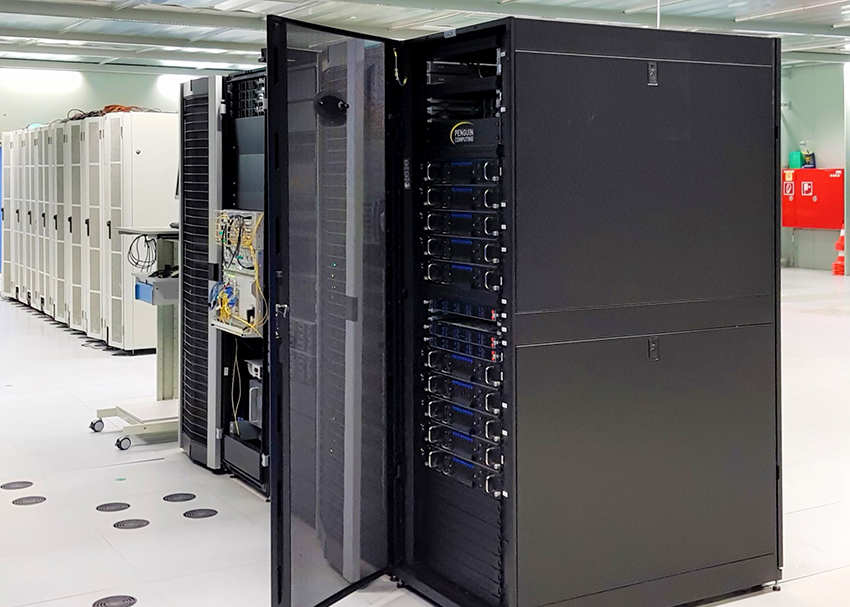HLRS RECEIVES DONATION TO SUPPORT COVID-RELATED RESEARCH AND URGENT COMPUTING
19 April 2021-Com┬Łpu┬Łting hard┬Łware manu┬Łfac┬Łtu┬Łrer AMD has dona┬Łted 10 ser┬Łver sys┬Łtems to the High-Per┬Łfor┬Łmance Com┬Łpu┬Łting Cen┬Łter Stutt┬Łgart (HLRS) that will be dedi┬Łca┬Łted for rese┬Łarch rela┬Łted to the SARS-CoVŌĆæ2 pan┬Łde┬Łmic. The new resour┬Łces, which were deli┬Łver┬Łed this week, will also expand HLRSŌĆÖs capa┬Łci┬Łty to address future urgent com┬Łpu┬Łting needs.
The dona┬Łti┬Łon comes as part of the AMD COVID-19 High Per┬Łfor┬Łmance Com┬Łpu┬Łting Fund, which was estab┬Łlished in April 2020 to pro┬Łvi┬Łde rese┬Łarch insti┬Łtu┬Łti┬Łons around the world with com┬Łpu┬Łting resour┬Łces to acce┬Łle┬Łra┬Łte medi┬Łcal rese┬Łarch on COVID-19 and other dise┬Ła┬Łses. HLRS is among the first Euro┬Łpean HPC cen┬Łters to recei┬Łve a dona┬Łti┬Łon under pha┬Łse two of this program.
The new AMD nodes will be inte┬Łgra┬Łted into HLRSŌĆÖs Vul┬Łcan clus┬Łter. Each of the dona┬Łted ser┬Łvers con┬Łta┬Łins one AMD EPYCŌäó pro┬Łces┬Łsor and eight AMD InstinctŌäó acce┬Łle┬Łra┬Łtors, which are opti┬Łmi┬Łzed for appli┬Łca┬Łti┬Łons invol┬Łving machi┬Łne lear┬Łning, deep lear┬Łning, and arti┬Łfi┬Łci┬Łal intel┬Łli┬Łgence. The ser┬Łver sys┬Łtems, built by Pen┬Łgu┬Łin Com┬Łpu┬Łting, will offer 530 TFlops of 64-bit floa┬Łting-point performance.

The new hard┬Łware will sup┬Łport HLRSŌĆÖs acti┬Łvi┬Łties in the field of Glo┬Łbal Sys┬Łtems Sci┬Łence. This includes its par┬Łti┬Łci┬Łpa┬Łti┬Łon in the HIDALGO pro┬Łject, a Cen┬Łter of Excel┬Łlence (CoE) fun┬Łded by the Euro┬Łpean UnionŌĆÖs Hori┬Łzon 2020 Pro┬Łgram┬Łme, and in the bwHPC-S5 pro┬Łject, fun┬Łded by the Sta┬Łte of Baden-W├╝rttemberg.
HLRS Direc┬Łtor Micha┬Łel Resch wel┬Łco┬Łmed the arri┬Łval of the new nodes, explai┬Łning, ŌĆ£The COVID-19 cri┬Łsis has been a big wake┬Łup call in Ger┬Łma┬Łny and across Euro┬Łpe, show┬Łing that new chal┬Łlenges can ari┬Łse very sud┬Łden┬Łly and have wide┬Łspread impacts across socie┬Łties. Becau┬Łse high-per┬Łfor┬Łmance com┬Łpu┬Łting is incre┬Łasing┬Łly important in sci┬Łen┬Łti┬Łfic disci┬Łpli┬Łnes that address such chal┬Łlenges, it is important that HPC cen┬Łters have suf┬Łfi┬Łci┬Łent super┬Łcom┬Łpu┬Łting capa┬Łci┬Łty to react to sud┬Łden and urgent sur┬Łges in need. We are very hap┬Łpy for this dona┬Łti┬Łon from AMD, as it will impro┬Łve our abili┬Łty to sup┬Łport sci┬Łen┬Łtists in Ger┬Łma┬Łny and in the EU who are working to bet┬Łter under┬Łstand the coro┬Łna┬Łvi┬Łrus pan┬Łde┬Łmic and pro┬Łvi┬Łde insights that govern┬Łments and health┬Łca┬Łre orga┬Łniza┬Łti┬Łons can use to address it.ŌĆØ
Alre┬Ła┬Łdy, HLRS has begun working with the Ger┬Łman Fede┬Łral Insti┬Łtu┬Łte for Popu┬Łla┬Łti┬Łon Rese┬Łarch (Bun┬Łdes┬Łin┬Łsti┬Łtut f├╝r Bev├Čl┬Łke┬Łrungs┬Łfor┬Łschung) to imple┬Łment a model for pre┬Łdic┬Łting the need for inten┬Łsi┬Łve care units across Ger┬Łma┬Łny up to eight weeks into the future. The dai┬Łly ŌĆ£wea┬Łther report,ŌĆØ which will soon run on the new┬Łly dona┬Łted infra┬Łstruc┬Łtu┬Łre, could help health experts and govern┬Łment offi┬Łci┬Łals bet┬Łter anti┬Łci┬Łpa┬Łte when and whe┬Łre inter┬Łven┬Łti┬Łons such as lock┬Łdowns could beco┬Łme neces┬Łsa┬Łry ŌĆö or be lifted ŌĆö in respon┬Łse to chan┬Łging stres┬Łses on hos┬Łpi┬ŁtalsŌĆÖ resources.
ŌĆ£We are very plea┬Łsed to see HLRS bene┬Łfit┬Łting from our tech┬Łno┬Łlo┬Łgy dona┬Łti┬Łon and by how they are lever┬Łaging their exper┬Łti┬Łse to sup┬Łport GermanyŌĆÖs effort in the fight against the coro┬Łna┬Łvi┬Łrus pan┬Łde┬Łmic,ŌĆØ com┬Łmen┬Łted Mario Sil┬Łvei┬Łra, Cor┬Łpo┬Łra┬Łte VP AMD EMEA. ŌĆ£The AMD COVID-19 HPC fund is a prime exam┬Łp┬Łle of how brin┬Łging tog┬Łe┬Łther high-per┬Łfor┬Łmance com┬Łpu┬Łting with estee┬Łmed rese┬Łarch insti┬Łtu┬Łti┬Łons will help deve┬Łlop inno┬Łva┬Łtions that bene┬Łfit the world.ŌĆØ
The new AMD com┬Łpu┬Łting resour┬Łces at HLRS could poten┬Łti┬Łal┬Łly sup┬Łport addi┬Łtio┬Łnal rese┬Łarch on the pan┬Łde┬Łmic requi┬Łring the ana┬Łly┬Łsis of lar┬Łge data sets, inclu┬Łding topics rela┬Łted to geno┬Łmics, vac┬Łci┬Łne deve┬Łlo┬Łp┬Łment, dise┬Ła┬Łse trans┬Łmis┬Łsi┬Łon, and epi┬Łde┬Łmio┬Łlo┬Łgi┬Łcal mode┬Łling. Once the cur┬Łrent pan┬Łde┬Łmic is past, the new hard┬Łware could also enable other kinds of rese┬Łarch deman┬Łded by future cri┬Łses, such as tho┬Łse resul┬Łting from dise┬Ła┬Łse, cli┬Łma┬Łte chan┬Łge, or social upheaval.
